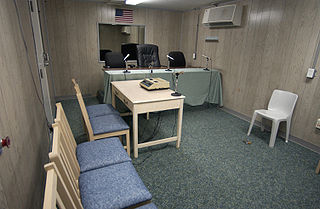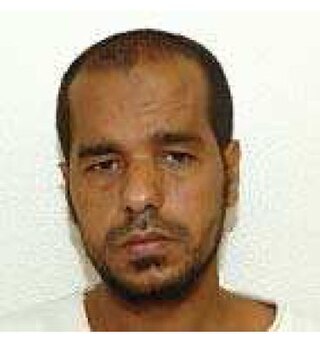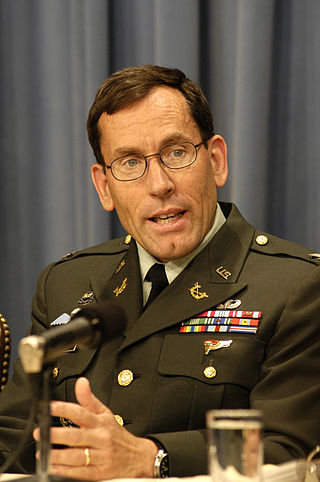
An unlawful combatant, illegal combatant or unprivileged combatant/belligerent is a person who directly engages in armed conflict in violation of the laws of war and therefore is claimed not to be protected by the Geneva Conventions. The International Committee of the Red Cross points out that the terms "unlawful combatant", "illegal combatant" or "unprivileged combatant/belligerent" are not defined in any international agreements. While the concept of an unlawful combatant is included in the Third Geneva Convention, the phrase itself does not appear in the document. Article 4 of the Third Geneva Convention does describe categories under which a person may be entitled to prisoner of war status. There are other international treaties that deny lawful combatant status for mercenaries and children.

Ibrahim Ahmed Mahmoud al Qosi is a Sudanese militant and paymaster for al-Qaeda. Qosi was held from January 2002 in extrajudicial detention in the United States Guantanamo Bay detainment camps, in Cuba. His Guantanamo Internment Serial Number is 54.
Rasul v. Bush, 542 U.S. 466 (2004), was a landmark decision of the United States Supreme Court in which the Court held that foreign nationals held in the Guantanamo Bay detention camp could petition federal courts for writs of habeas corpus to review the legality of their detention. The Court's 6–3 judgment on June 28, 2004, reversed a D.C. Circuit decision which had held that the judiciary has no jurisdiction to hear any petitions from foreign nationals held in Guantanamo Bay.

The Combatant Status Review Tribunals (CSRT) were a set of tribunals for confirming whether detainees held by the United States at the Guantanamo Bay detention camp had been correctly designated as "enemy combatants". The CSRTs were established July 7, 2004 by order of U.S. Deputy Secretary of Defense Paul Wolfowitz after U.S. Supreme Court rulings in Hamdi v. Rumsfeld and Rasul v. Bush and were coordinated through the Office for the Administrative Review of the Detention of Enemy Combatants.
Hamdan v. Rumsfeld, 548 U.S. 557 (2006), is a United States Supreme Court case in which the Court held that military commissions set up by the Bush administration to try detainees at Guantanamo Bay violated both the Uniform Code of Military Justice (UCMJ) and the Geneva Conventions ratified by the U.S.

Salim Ahmed Salim Hamdan is a Yemeni man, captured during the invasion of Afghanistan, declared by the United States government to be an illegal enemy combatant and held as a detainee at Guantanamo Bay from 2002 to November 2008. He admits to being Osama bin Laden's personal driver and said he needed the money.
Ghassan Abdallah Ghazi al-Sharbi is a Saudi citizen who was held in extrajudicial detention in the United States Guantanamo Bay detention camps, in Cuba. His Guantanamo Internment Serial Number was 682.
Peter E. Brownback III is a retired military officer and lawyer. He was appointed in 2004 by general John D. Altenburg as a Presiding Officer on the Guantanamo military commissions. The Washington Post reported: "...that Brownback and Altenburg have known each other since 1977, that Brownback's wife worked for Altenburg, and that Altenburg hosted Brownback's retirement party in 1999."

Colonel Frederic L. Borch was a career United States Army attorney with a master's degree in national security studies, who served as chief prosecutor of the Guantanamo military commissions. He resigned his commission in August 2005 after three prosecutors complained that he had rigged the system against providing due process to defendants. He was replaced by Robert L. Swann

In the practice of international law, command responsibility is the legal doctrine of hierarchical accountability for war crimes, whereby a commanding officer (military) and a superior officer (civil) is legally responsible for the war crimes and the crimes against humanity committed by his subordinates; thus, a commanding officer always is accountable for the acts of commission and the acts of omission of his soldiers.

The Military Commissions Act of 2006, also known as HR-6166, was an Act of Congress signed by President George W. Bush on October 17, 2006. The Act's stated purpose was "to authorize trial by military commission for violations of the law of war, and for other purposes".

William "Bill" C. Kuebler was an American lawyer and a Commander in the United States Navy Judge Advocate General's Corps, assigned to the U.S. Navy Office of the Judge Advocate General, International and Operational Law Division. Kuebler was previously assigned to the Office of Military Commissions. Prior to the decision of the United States Supreme Court in Hamdan v. Rumsfeld, to overturn the then current version of the Guantanamo military commissions on constitutional grounds, Kuebler was detailed to defend Ghassan Abdullah al Sharbi. Al Sharbi had insisted on representing himself and Kuebler refused superior orders to act as his lawyer.

Ali Hamza Ahmad Suliman al-Bahlul is a Yemeni citizen who has been held as an enemy combatant since 2002 in the United States Guantanamo Bay detention camp. He boycotted the Guantanamo Military Commissions, arguing that there was no legal basis for the military tribunals to judge him.
No-Hearing Hearings (2006) is the title of a study published by Professor Mark P. Denbeaux of the Center for Policy and Research at Seton Hall University School of Law, his son Joshua Denbeaux, and prepared under his supervision by research fellows at the center. It was released on October 17, 2006. It is one of a series of studies on the Guantanamo Bay detention center, the detainees, and government operations that the Center for Policy and Research has prepared based on Department of Defense data.
Keith Johns Allred was an American Naval officer and Naval trial lawyer, beginning his career with the US Seventh Fleet aboard several Naval destroyers, from 1979 to 1982. From 1985, until his retirement in 2009, he oversaw the Western Pacific Judicial Circuit as a Circuit Trial Judge. He was also the presiding judge at the Guantanamo military commission where he notably oversaw the trial of Salim Hamdan.
Al Odah v. United States is a court case filed by the Center for Constitutional Rights and co-counsels challenging the legality of the continued detention as enemy combatants of Guantanamo detainees. It was consolidated with Boumediene v. Bush (2008), which is the lead name of the decision.
In United States law, habeas corpus is a recourse challenging the reasons or conditions of a person's detention under color of law. The Guantanamo Bay detention camp is a United States military prison located within Guantanamo Bay Naval Base. A persistent standard of indefinite detention without trial and incidents of torture led the operations of the Guantanamo Bay detention camp to be challenged internationally as an affront to international human rights, and challenged domestically as a violation of the Due Process Clause of the Fifth and Fourteenth amendments of the United States Constitution, including the right of petition for habeas corpus. On 19 February 2002, Guantanamo detainees petitioned in federal court for a writ of habeas corpus to review the legality of their detention.
Ralph Harold Kohlmann is an American lawyer and retired United States Marine Corps officer.
A number of incidents stemming from the September 11 attacks have raised questions about legality.

Donald Joseph Guter is an American educator, lawyer and retired United States Navy rear admiral who was the 10th president and dean of South Texas College of Law Houston from 2009 to 2019. He previously served as the 10th dean of the Duquesne University School of Law from 2005 to 2008, when he was dismissed by Duquesne University president Charles J. Dougherty over a tenure battle.










